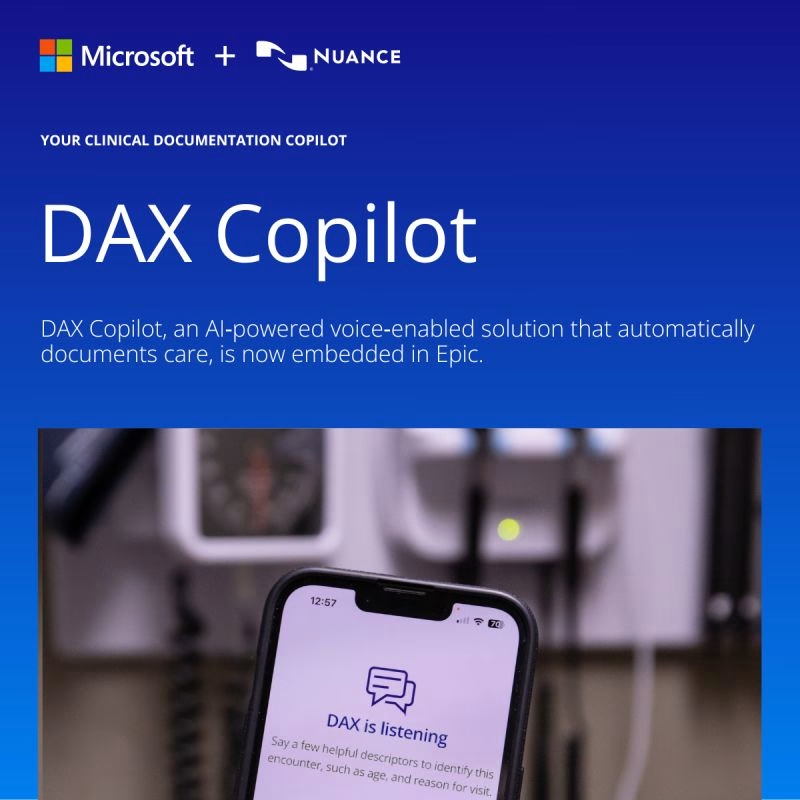The healthcare industry stands at the precipice of a technological revolution that promises to transform how medical professionals document patient encounters and manage clinical workflows. At the forefront of this transformation is ambient clinical intelligence, a groundbreaking technology that combines artificial intelligence, natural language processing, and voice recognition to automatically capture and document patient-provider conversations in real-time.
Nuance DAX, now part of the Microsoft healthcare ecosystem, represents the pinnacle of this technological advancement. This innovative solution addresses one of healthcare’s most persistent challenges: the administrative burden that consumes valuable time physicians could otherwise spend with patients. As healthcare systems worldwide grapple with physician burnout, staffing shortages, and increasing documentation requirements, ambient clinical intelligence emerges as a beacon of hope for sustainable healthcare delivery.
🚀 Understanding Ambient Clinical Intelligence
Ambient clinical intelligence represents a paradigm shift from traditional documentation methods to a seamless, automated approach that works in the background during patient encounters. Unlike conventional electronic health record systems that require active input from healthcare providers, this technology passively listens to conversations between patients and clinicians, automatically generating comprehensive clinical notes without interrupting the natural flow of the consultation.
🎯 Core Components of Ambient Intelligence
The technology relies on several sophisticated components working in harmony:
Natural Language Processing (NLP): Advanced algorithms analyze spoken conversations, identifying medical terminology, symptoms, diagnoses, and treatment plans with remarkable accuracy. These systems understand context, medical abbreviations, and complex clinical scenarios.
Voice Recognition Technology: High-precision speech-to-text conversion captures multiple speakers simultaneously, distinguishing between patient and provider voices while filtering out background noise and irrelevant conversations.
Clinical Decision Support: Integrated AI systems provide real-time suggestions for diagnoses, treatment options, and follow-up care based on the conversation content and patient history.
Integration Capabilities: Seamless connectivity with existing electronic health record systems ensures that generated documentation flows directly into established workflows without requiring additional manual intervention.
📈 The Nuance DAX Revolution
Nuance DAX has established itself as the gold standard in ambient clinical intelligence, transforming the way healthcare providers approach documentation. This sophisticated DAX AI platform captures the nuances of patient-provider interactions, converting natural conversations into structured clinical notes that meet documentation standards and regulatory requirements
🔧 Technical Architecture and Capabilities
The platform operates through a multi-layered architecture that ensures both accuracy and security:
- Audio Capture Layer: Secure recording systems that comply with HIPAA requirements while maintaining crystal-clear audio quality
- Processing Engine: Real-time analysis of conversations using advanced machine learning models trained on millions of clinical encounters
- Documentation Generation: Automated creation of clinical notes in standardized formats compatible with major EHR systems
- Quality Assurance: Multi-step verification processes that ensure accuracy and completeness of generated documentation
🌟 Key Features and Benefits
Nuance DAX offers several compelling advantages that have made it the preferred choice for healthcare organizations:
Time Savings: Clinical studies demonstrate that physicians using ambient clinical intelligence save an average of 2-3 hours per day on documentation tasks, allowing more time for patient care and reducing after-hours charting.
Improved Accuracy: AI-powered documentation reduces transcription errors and ensures comprehensive capture of clinical information that might be missed in manual note-taking.
Enhanced Patient Engagement: With providers freed from typing or writing notes during consultations, they can maintain better eye contact and build stronger relationships with patients.
Reduced Burnout: By eliminating the administrative burden of documentation, healthcare providers report decreased stress levels and improved job satisfaction.
💼 Microsoft Healthcare Integration
The acquisition of Nuance by Microsoft has created unprecedented opportunities for innovation in healthcare technology. This strategic partnership combines Microsoft’s cloud computing infrastructure and AI capabilities with Nuance’s deep expertise in healthcare documentation and voice recognition.
☁️ Cloud-First Approach
Microsoft’s Azure cloud platform provides the robust infrastructure necessary to support large-scale deployment of ambient clinical intelligence:
Scalability: Azure’s global infrastructure ensures that healthcare organizations of all sizes can access ambient clinical intelligence capabilities without significant upfront investments in hardware or IT infrastructure.
Security: Microsoft’s comprehensive security framework, including advanced encryption, identity management, and compliance tools, protects sensitive healthcare data throughout the documentation process. The HIPAA compliance standards are strictly maintained across all processing layers.
Reliability: Enterprise-grade uptime guarantees and disaster recovery capabilities ensure that critical documentation systems remain available when healthcare providers need them most.
🔗 Integration with Microsoft 365 and Teams
The synergy between Nuance DAX and Microsoft’s productivity suite creates a comprehensive healthcare communication and documentation platform:
- Teams Integration: Healthcare providers can conduct virtual consultations with ambient documentation capabilities, expanding access to care while maintaining comprehensive record-keeping
- SharePoint Connectivity: Clinical notes and documentation can be seamlessly stored and shared across healthcare teams through integrated SharePoint workflows
- Power BI Analytics: Advanced reporting and analytics capabilities provide insights into clinical patterns, documentation efficiency, and quality metrics
🏥 Impact on Clinical Workflows
The implementation of ambient clinical intelligence fundamentally transforms how healthcare organizations operate, creating ripple effects throughout the entire care delivery system.
🔄 Workflow Transformation Benefits
Streamlined Processes: Healthcare providers can focus on clinical decision-making rather than administrative tasks, leading to more efficient use of expertise and resources.
Enhanced Collaboration: Comprehensive documentation enables better communication between healthcare team members, improving care coordination and patient outcomes.
Regulatory Compliance: Automated documentation ensures consistent adherence to regulatory requirements and coding standards, reducing compliance risks and audit concerns. Organizations benefit from built-in compliance with CMS documentation guidelines and other regulatory frameworks.
Quality Improvement: Detailed capture of clinical encounters provides valuable data for quality improvement initiatives and research activities.
🔮 Future Developments and Innovations
The future of ambient clinical intelligence extends far beyond current capabilities, with emerging technologies promising even greater transformation of healthcare delivery.
🤖 Advanced AI Capabilities
Next-generation ambient clinical intelligence systems will incorporate increasingly sophisticated AI capabilities:
Predictive Analytics: AI systems will analyze conversation patterns and clinical data to identify potential health risks and suggest preventive interventions before symptoms manifest.
Personalized Documentation: Machine learning algorithms will adapt to individual provider preferences and specialties, creating customized documentation styles that reflect each clinician’s approach to patient care.
Multi-modal Integration: Future systems will incorporate visual and sensor data alongside audio information, creating comprehensive records that capture all aspects of patient encounters.
🌐 Expansion Across Healthcare Settings
Ambient clinical intelligence will expand beyond traditional clinical settings to encompass:
- Home Healthcare: Mobile applications that enable comprehensive documentation during home visits and remote consultations
- Specialty Practices: Customized solutions for specialized medical fields with unique documentation requirements and terminology
- Emergency Medicine: Real-time documentation capabilities designed for fast-paced emergency department environments
- Mental Health: Specialized systems that capture the nuances of psychological and psychiatric consultations while maintaining appropriate sensitivity
🔬 Research and Development Priorities
Ongoing research efforts focus on several key areas that will shape the future of ambient clinical intelligence:
Multilingual Capabilities: Development of systems that can accurately process medical conversations in multiple languages, supporting diverse patient populations and international healthcare markets.
Specialty-Specific Models: Creation of AI models trained specifically for different medical specialties, ensuring accurate capture of specialized terminology and procedures.
Real-time Clinical Decision Support: Integration of evidence-based guidelines and clinical decision-making tools that provide immediate recommendations during patient encounters. These systems leverage research from institutions like the Agency for Healthcare Research and Quality to ensure evidence-based care delivery.
Interoperability Standards: Development of universal standards that enable seamless integration between different healthcare systems and technology platforms.
🎯 Implementation Strategies for Healthcare Organizations
Successfully deploying ambient clinical intelligence requires careful planning and consideration of organizational factors that influence adoption and effectiveness.
📊 Assessment and Planning Phase
Healthcare organizations should conduct comprehensive evaluations before implementation:
Workflow Analysis: Detailed examination of current documentation processes, identifying bottlenecks and inefficiencies that ambient clinical intelligence can address.
Technology Infrastructure: Assessment of existing IT capabilities, network capacity, and integration requirements to support new documentation systems.
Staff Readiness: Evaluation of provider comfort levels with technology and identification of training needs to ensure successful adoption.
Financial Planning: Analysis of implementation costs, potential savings, and return on investment projections to justify the technology investment.
🏆 Best Practices for Deployment
Successful implementations typically follow proven methodologies:
- Pilot Programs: Start with small-scale pilots in select departments or specialties to validate effectiveness and identify potential issues
- Phased Rollouts: Gradual expansion across the organization allows for iterative improvements and reduces implementation risks
- Comprehensive Training: Extensive education programs ensure that all users understand system capabilities and best practices
- Continuous Monitoring: Ongoing assessment of system performance and user satisfaction enables optimization and continuous improvement
💡 Conclusion
The convergence of Nuance DAX and Microsoft represents a transformative moment in healthcare technology, offering unprecedented opportunities to address long-standing challenges in clinical documentation and provider burnout. Ambient clinical intelligence has evolved from a promising concept to a practical solution that delivers measurable benefits to healthcare organizations worldwide.
As this technology continues to mature, healthcare providers can expect even greater capabilities, improved accuracy, and expanded applications that will fundamentally reshape how medical care is documented and delivered. Organizations that embrace ambient clinical intelligence today position themselves at the forefront of healthcare innovation, creating sustainable advantages in quality, efficiency, and provider satisfaction.
The future of healthcare documentation is not just about capturing what happened during patient encounters – it’s about creating intelligent systems that enhance clinical decision-making, improve patient outcomes, and restore the joy of practicing medicine. Through the powerful combination of Nuance DAX and Microsoft’s technological ecosystem, this future is rapidly becoming reality for healthcare organizations ready to embrace the transformation.

